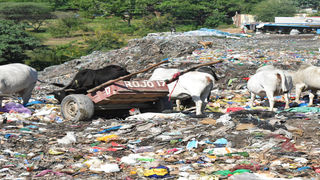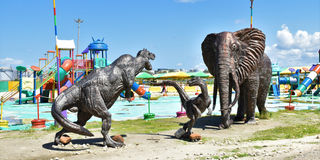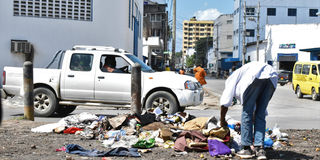
Cows eat domestic waste from an illegal dumpsite at Miritini, in Mombasa County on June 30, 2021. The County government is struggling to curb the runaway garbage menace in vain. As garbage mounts by illegal waste collectors dirt the coastal city.
|Mombasa
Premium
Mombasa choking in garbage as interventions fail
Mombasa is Kenya’s second-largest city after Nairobi, famous for its beautiful beaches, world-class resorts, cultural heritage and historical significance.
The island port city is also the country’s foremost destination for local and international tourists.
But behind the glamour and flair, the county government is still grappling with waste management, which appears to be endemic, tainting the good image of the tourism hub.
Residents have had to put up with strings of broken vows from the administration since devolution on how officials planned to address the overwhelming garbage menace.
Despite numerous efforts by Governor Hassan Joho’s administration, the county is slowly creeping back to dirt. Mounds of garbage can be seen in various locations in the central business district and residential areas.
Consequently, the authorities have launched day and night clean-up campaigns, such as the ‘Mambo Safi’ and ‘Mji Wetu Wajibu Wetu’ initiatives to enhance sanitation.
Plans to build a recycling plant are slowly picking up pace as the county seeks solutions the world over to help develop sustainable waste management concepts.

Mombasa County truck passes along Jomo Kenyatta Avenue as it ferries garbage to Mwakirunge Dumpsite, 25km away from the port city. The road to Mwakirunge and the distance has proved to be an uphill task as far as waste management is concerned.
During the 2017 election campaigns, Governor Joho promised to deal with the garbage problem after his opponents turned the county's poor solid waste management strategies into campaign fodder.
In his first term, Mr Joho transferred the waste management function from the Water and Sanitation Department to Education, which was under Tendai Lewa as the executive.
The governor contracted a private firm to clear garbage at the cost of Sh300 million a year but the agreement was terminated because it was costly and unsustainable.
To rid the country’s tourism hub of garbage, Governor Joho has created the Department of Environment and Waste Management, arguing that his administration will develop and enforce strategies and policies regarding waste collection and management.
He appointed Dr Godfrey Nyongesa Nato in November 2017 as the executive for this docket, giving him a resounding warning to “put on gloves” and clear the garbage or face impeachment if he fails to deliver.
“You should put on gloves and clear the garbage in this town. When we were vetting you, you told us how you will bring sanity and order to this county. You do not have a choice,” Mr Joho told him immediately after he was sworn in.
In April 2018, Mr Joho ordered the closure of the Kibarani dumpsite, which was an eyesore for residents and guests coming from Moi International Airport and the west of the island.
This was completed within two months and the 50-year-old infamous site began a journey of transformation into a recreational facility.
The county government, working closely with Mombasa Cement, Tourism Cabinet Secretary Najib Balala and Environment and Forestry CS Keriako Tobiko managed to transform the filthy site into a beautiful recreational park for residents.
The rehabilitation team then undertook a project involving replanting trees at the park.

The new look of the rehabilitated Kibarani dumpsite that was closed by Mombasa Governor Hassan Joho in 2018. The Park is now a recreational facility where residents go for picnics and photo sessions.
The site was decommissioned in August 2018, after Mr Balala announced the launch of the Mombasa regeneration initiative that would see several areas, including Pirates beach, Mama Ngina Drive Park and the Kibarani dumpsite, rehabilitated.
Residents thronged the transformed Kibarani recreational site to usher in 2020 in new-year celebrations organised by the county government.
Waste management continued to be a challenge for county officials, even after the Mwakirunge dumpsite was expanded.
Mwakirunge, established in 2008 to ease pressure on the old Kibarani dumping ground, is in Bamburi, 25km from the city.
County Chief Officer for Environment Ilhan Abbas has occasionally said that the long distance and the poor infrastructure to the new location are great hurdles for waste managers.
The issue is compounded when it rains. “The road network to Mwakirunge and back is our biggest headache. This is a road that needs to be improved,” she said in an interview with the Nation.
“Mombasa County cannot take charge of the road and rebuild it. It is not our mandate but we still have to use it.”
She added that the county was working on a regulatory framework to guide solid waste management.
Mombasa produces up to 2,000 tonnes of garbage daily, she said, with many people depending on community-based garbage collectors to dispose of their waste.
Ms Abbas noted that registering trash collectors will make it easier to track them.
“Apart from waste collectors taking garbage to designated places for transfer to dumping sites, there are those who dispose of it haphazardly,” she said.
“If they are registered, we will be able to know when the waste collectors have not delivered the garbage to the right locations.”

A man scavenges through garbage along Lumumba Road at an unauthorised location on June 30, 2021. The County government says the issue of illegal dumping is the cause of dirt in the devolved unit.
The department proposed a bill to establish ward solid waste management committees to coordinate and mobilise the enforcement of the law.
Dr Nato, the Environment executive, said officials have worked to keep Mombasa clean but more needs to be done.
He cited the case of the Kibarani, Kongowea and VOK dumpsites as sites that have been cleared of garbage.
But the VOK site, which was meant to be sealed off, remains at the centre of controversy, with residents helplessly watching as the waste grows into sprawling mountains of garbage from what the county calls illegal dumping.
Illegal dumping is choking the tourism hub. Nonetheless, to deal with the problem, the devolved unit imposed a Sh500,000 to Sh1,000,000 fine, depending on the quantity of the waste dumped, in an attempt to address the issue.
Through stringent, radical measures and strategies, the department of Environment wants to rid the city of careless garbage dumping and littering.
“We are grappling with garbage generated by residents but we will deal with the challenges through the laws. We are also sensitising residents on how to ensure cleanliness,” Ms Abass said.
Waste collectors, their carts and vehicles that are registered or licensed, officials said, will have uniforms unique to the wards they operate in as well as county badges and stickers displayed on their carts or vehicles identifying them to residents, landlords, businessmen and other waste generators.
The department also introduced a monthly clean-up exercise every last Saturday of the month. But this ended because of Covid-19 restrictions on social gatherings.
In the 2020/2021 budget, the county had proposed allocating Sh1 billion to the Department of Environment, representing seven per cent of the county budget of Sh14.6 billion.





